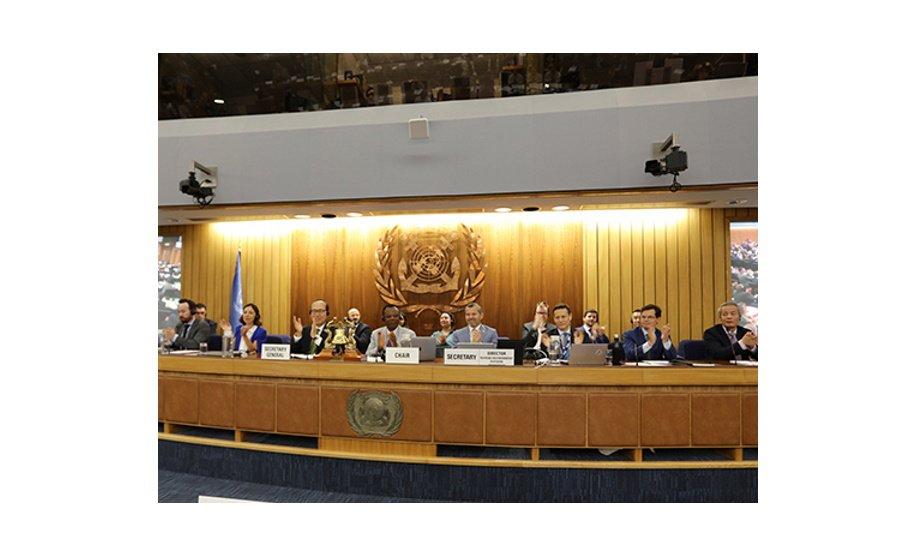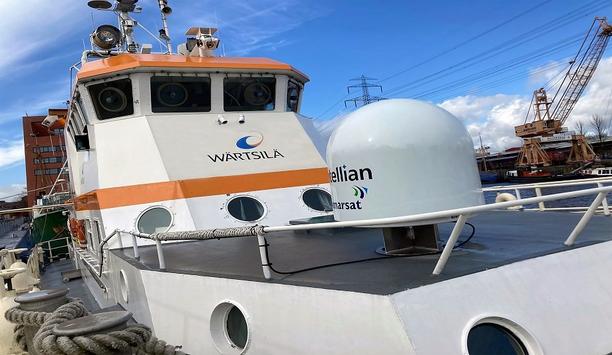International Maritime Organization (IMO) adopts revised strategy to reduce greenhouse gas (GHG) emissions from international shipping.
Member States of the International Maritime Organization (IMO), meeting at the Marine Environment Protection Committee (MEPC 80), have adopted the 2023 IMO Strategy on Reduction of GHG Emissions from Ships, with enhanced targets to tackle harmful emissions.
Revised IMO GHG Strategy
The revised IMO GHG Strategy includes an enhanced common ambition to reach net-zero GHG emissions from international shipping close to 2050, a commitment to ensure an uptake of alternative zero and near-zero GHG fuels by 2030, as well as indicative check-points for 2030 and 2040.
The adoption of the 2023 IMO Greenhouse Gas Strategy is a monumental development for IMO"
IMO Secretary-General, Kitack Lim said: “The adoption of the 2023 IMO Greenhouse Gas Strategy is a monumental development for IMO and opens a new chapter towards maritime decarbonisation."
He adds, "At the same time, it is not the end goal; it is in many ways a starting point for the work that needs to intensify even more over the years and decades ahead of us. However, with the Revised Strategy that you have now agreed on, we have a clear direction, a common vision, and ambitious targets to guide us to deliver what the world expects from us.”
2023 IMO Greenhouse Gas Strategy
Kitack Lim continues, “Above all, it is particularly meaningful, to have unanimous support from all Member States. In this regard, I believe that we have to pay more attention to support developing countries, in particular SIDS and LDCs, so that no one is left behind.”
IMO is the United Nations specialised agency with responsibility for developing global standards for shipping and supporting countries to implement those rules.
Elements of the Strategy are outlined below:
2023 IMO Strategy on Reduction of GHG Emissions from Ships
The 2023 IMO Strategy on Reduction of GHG Emissions from Ships (the 2023 IMO GHG Strategy) represents the continuation of work by IMO as the appropriate international body to address greenhouse gas (GHG) emissions from international shipping.
Vision
IMO remains committed to reducing GHG emissions from international shipping
IMO remains committed to reducing GHG emissions from international shipping and, as a matter of urgency, aims to phase them out as soon as possible, while promoting, in the context of this Strategy, a just and equitable transition.
Levels of ambition
Levels of ambition directing the 2023 IMO GHG Strategy are as follows:
- Carbon intensity of the ship to decline through further improvement of the energy efficiency for new ships to review with the aim of strengthening the energy efficiency design requirements for ships;
- Carbon intensity of international shipping to decline to reduce CO2 emissions per transport work, as an average across international shipping, by at least 40% by 2030, compared to 2008;
- Uptake of zero or near-zero GHG emission technologies, fuels and/or energy sources to increase uptake of zero or near-zero GHG emission technologies, fuels and/or energy sources to represent at least 5%, striving for 10%, of the energy used by international shipping by 2030; and
- GHG emissions from international shipping to reach net zero to peak GHG emissions from international shipping as soon as possible and to reach net-zero GHG emissions by or around, i.e. close to 2050, taking into account different national circumstances, whilst pursuing efforts towards phasing them out as called for in the Vision consistent with the long-term temperature goal set out in Article 2 of the Paris Agreement.
Indicative checkpoints
Indicative checkpoints to reach net-zero GHG emissions from international shipping:
- To reduce the total annual GHG emissions from international shipping by at least 20%, striving for 30%, by 2030, compared to 2008; and
- To reduce the total annual GHG emissions from international shipping by at least 70%, striving for 80%, by 2040, compared to 2008.
Basket of candidate mid-term GHG reduction measures
The 2023 GHG Strategy states that a basket of candidate measure(s), delivering on the reduction targets, should be developed and finalised comprised of both: a technical element, namely a goal-based marine fuel standard regulating the phased reduction of the marine fuel's GHG intensity; and an economic element, on the basis of a maritime GHG emissions pricing mechanism.
The candidate economic elements will be assessed observing specific criteria to be considered in the comprehensive impact assessment, with a view to facilitating the finalisation of the basket of measures.
Mid-term GHG reduction measures
The mid-term GHG reduction measures should effectively promote the energy transition of shipping
The mid-term GHG reduction measures should effectively promote the energy transition of shipping and provide the world fleet a needed incentive while contributing to a level playing field and a just and equitable transition.
Impacts on States
The strategy says that the impacts on States of a measure/combination of measures should be assessed and taken into account as appropriate, before adoption of the measure, in accordance with the revised procedure for assessing impacts on States of candidate measures. Particular attention should be paid to the needs of developing countries, especially SIDS and LDCs.
- Barriers and supportive actions; capacity-building and technical cooperation; R&D
In the Strategy, the Committee recognises that developing countries, in particular LDCs and SIDS, have special needs with regard to capacity-building and technical cooperation. An appendix provides an overview of relevant IMO initiatives supporting the reduction of GHG emissions from ships.
These include: the IMO Integrated Technical Cooperation Programme (ITCP); voluntary multi-donor trust fund ("GHG TC-Trust Fund"); the Global Maritime Technologies Cooperation Centres (MTCC) Network (GMN) EU supported project; the Norway supported Green Voyage 2050 project; the GHG-SMART Programme and Future Fuels and Technology for Low- and Zero-carbon Shipping Projects (FFT project) supported by Republic of Korea; the UNDP-GEF GloFouling Partnerships project; the Norway supported TEST Biofouling (Transfer of Environmentally Sound Technologies) project; the Kingdom of Saudi Arabia-supported IMO CARES (Coordinated Actions to Reduce Emissions from Shipping) Foundation Project; the IMO-UNEP-Norway Innovation Forum; the IMO-EBRD-World Bank co-led Financing Sustainable Maritime Transport (FIN-SMART) Roundtable; and the NextGEN (Green and Efficient Navigation) portal and NextGEN Connect projects. (Read more on these initiatives).
Next steps
The 2023 Strategy sets out a timeline towards adoption of the basket of measures and adoption of the updated 2028 IMO GHG Strategy on reduction of GHG emissions from ships:
- MEPC 81 (Spring 2024) - Interim report on Comprehensive impact assessment of the basket of candidate mid-term measures/Finalisation of basket of measures
- MEPC 82 (Autumn 2024) - Finalised report on Comprehensive impact assessment of the basket of candidate mid-term measures
- MEPC 83 (Spring 2025) - Review of the short-term measure to be completed by 1 January 2026
- MEPC 84 (Spring 2026) - Approval of measures / Review of the short-term measure (EEXI and CII) to be completed by 1 January 2026
- Extraordinary one or two-day MEPC (six months after MEPC 83 in Autumn 2025) - Adoption of measures
Target dates:
- MEPC 85 (Autumn 2026)
- 16 months after adoption of measures (2027) - Entry into force of measures
- MEPC 86 (Summer 2027) - Initiate the review of the 2023 IMO GHG Strategy
- MEPC 87 (Spring 2028)
- MEPC 88 (Autumn 2028) - Finalisation of the review of the 2023 IMO GHG Strategy with a view to adoption of the 2028 IMO Strategy on reduction of GHG emissions from ships.
Life cycle GHG assessment guidelines adopted
The MEPC adopted Guidelines on life cycle GHG intensity of marine fuels for consideration and adoption
The MEPC adopted Guidelines on life cycle GHG intensity of marine fuels (LCA guidelines) for consideration and adoption. The LCA guidelines allow for a Well-to-Wake calculation, including Well-to-Tank and Tank-to-Wake emission factors, of total GHG emissions related to the production and use of marine fuels.
Interim guidance on the use of biofuels
The MEPC approved an MEPC circular on Interim guidance on the use of biofuels under regulations 26, 27 and 28 of MARPOL Annex VI (DCS and CII).
Marine Environment Protection Committee (MEPC 80)
The Marine Environment Protection Committee (MEPC) addresses environmental issues under IMO's remit. This includes the control and prevention of ship-source pollution covered by the MARPOL treaty, including oil, chemicals carried in bulk, sewage, garbage and emissions from ships, including air pollutants and greenhouse gas emissions.
Other matters covered include ballast water management, anti-fouling systems, ship recycling, pollution preparedness and response, and identification of special areas and particularly sensitive sea areas. MEPC 80 met 3-7 July 2023 at IMO Headquarters in London. It was attended by some 1,800 delegates (in person and remotely).
Other agenda items
The outcome of the MEPC 80 on other agenda items will follow.











